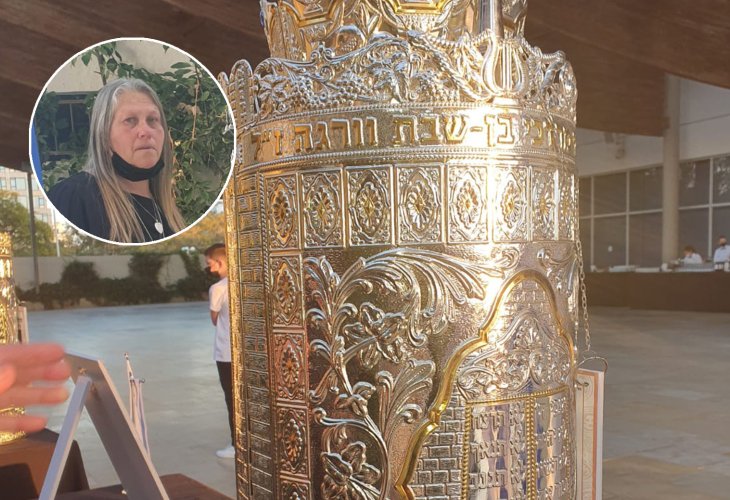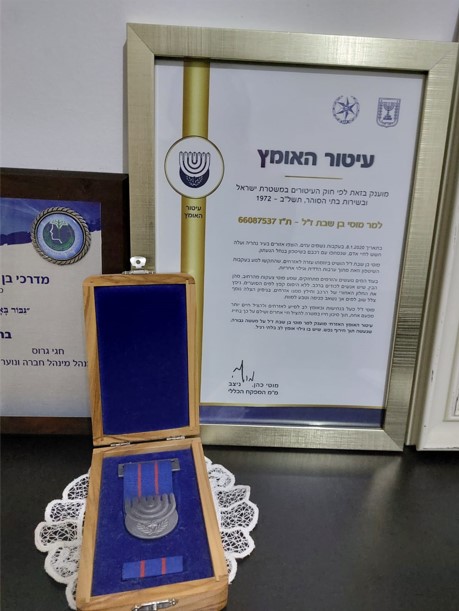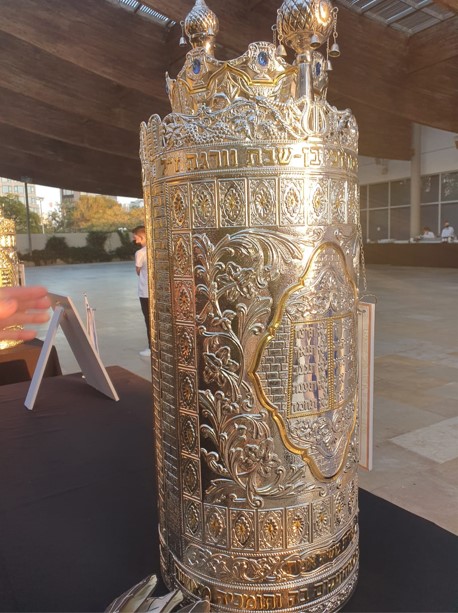"I Couldn't Believe Moti Was Swept Away, He Was Just Here"
Moti Ben Shabbat tried to save his neighbors who were stranded in their car in the floodwaters. It was the last time his mother saw him. In an emotional conversation, Chava, his mother, shares stories about her special son who returned to faith and the memorials they are establishing for his soul.
 (In the circle: Chava Ben Shabbat)
(In the circle: Chava Ben Shabbat)"Like Nachshon ben Aminadav – Moti was the first to jump into the water," says Chava Ben Shabbat, Moti's mother, who died about two and a half years ago when he jumped into the Ga'aton River in Nahariya to save a stranded car. Her voice breaks with tears.
Two and a half years have passed since then. A significant amount of time, but the pain still burns, and she speaks of Moti with deep longing. She recently attended a special ceremony where a Torah scroll was dedicated in his name in the community of Nofim. "I came to the event, and for the first time, I felt there was something that comforted me and gave me strength," she reveals.

A Man of Giving
"Moti was a special personality," says Chava, "and it's not just because he was my son. He really was a good soul. Everyone in the city knew him and knew that if they needed help with anything – Moti was always available and willing to help with a smile. He was deeply involved in charitable donations for the needy and even traveled to military bases across the country to distribute gifts and equipment to soldiers.
"About seven years ago, Moti strengthened his faith and returned to religious observance. As parents, we made it clear we were with him all the way, adapted our home accordingly, and prepared for many of the religious practices he explained to us. However, I never knew he was also bringing others closer to Judaism. Only after he passed did all sorts of young men come to us and show us that he had given them prayer books with personal dedications." Chava pauses, her voice choked. "I can't believe he's no longer with us," she whispers.
There's also an eerie coincidence: "On the day of Moti's funeral, it coincided with my birthday. Clearly, there's something heavenly about this. I don't know if there is another mother in the whole of Israel who buried her son on her birthday. It's undeniably not just a coincidence."
What happened on the day of the tragedy? Were you at home when it all occurred?
"Yes, I was at home with my husband and Moti. The weather outside was extremely wintry, with terrible rains. I can't remember weather like that before. I went down to shop at the supermarket, and when I returned, I was caught in a downpour. At that moment, I called my eldest daughter and asked her to bring her daughter home from kindergarten because in such weather, you must be at home.
"Meanwhile, Moti went to the window, and suddenly I heard him shout because chaos started in the street. It turned out that there was an elderly couple stuck in a car, and Moti, the righteous, ran to rescue them. He got them out of the car, then came home, took warm blankets, and brought them down so they could warm up. He shouted to me: 'Mom, prepare them tea in a thermos,' and then he brought them cups of tea, refreshments, and even two chairs. He cared for them so devotedly; tears sparkled in my eyes.
"Afterward, he went upstairs to change his clothes because he was soaked. Meanwhile, I kept watching from the balcony, and suddenly I saw a jeep sinking—it was the jeep of our disabled neighbor. I started to shout in panic: 'He's dead, he's dead, the neighbor is dead!' I was crying and shouting. Only later did my daughter tell me: 'Mom, you must have felt something. The screams you screamed were not normal; you felt something terrible was going to happen.'"
Chava describes the next moments with deep pain: "It happened so quickly, Moti went down to the street with my husband. He probably tried to enter the sinking car because they said someone was inside. But the powerful current did not allow him to do so, and he was swept away with the floodwaters toward the sea. When I realized what had happened, I went downstairs, and firefighters and police arrived with me. I begged everyone: 'Bring me Moti,' but they couldn't help. Only then did I begin to understand—Moti was swept away with the current and was no longer with us. About an hour later, they found him lying on the beach. It was too late to save him."

"We've Learned Not to Ask Questions Because There Are No Answers"
"After Moti passed away, I had so many questions," Chava confesses candidly. "I asked myself: How did this happen to Moti? He was so good, really doing everything he should. Why did Hashem do this to him? I also can't understand why this happened to me. Why do I deserve such a blow?
"People try to comfort me. But I always tell them: 'I wish you never have to go through such trials.' This is a catastrophe like no other in Israel. During the seven days of mourning, so many comforters came to us, saying: 'Stay strong, you need to continue living.' But how can we continue living like this, with so much pain? Those who haven't walked in our shoes can never understand.
"We lost a son who was all about love and giving. He was unusually devoted to us and showed endless respect to parents. For him, lunch at mom's was something he would never skip, and I heard from people he worked with that he wouldn’t taste anything because 'soon I’ll be home and I’ll eat my mom's food.' Now, as Passover approaches, I feel his absence particularly painfully because he would always prepare for the holiday with full devotion. He managed the cleaning with firm leadership and bought all the utensils, supplies, and food. Passover was his holiday, and the void left is so large."
And what gives you the strength to keep going?
"Actions. Since Moti passed, we've all tried to strengthen ourselves and others in every way possible. I travel a lot to the graves of righteous people, the Western Wall, and the Cave of the Patriarchs, praying to Hashem to give us strength, as we are truly depleted of energy.
"Since the tragedy, I've also tried to continuously do things for the elevation of Moti's soul. I continue his path in buying salads and food products and transferring them to families in need. And on the anniversary of his passing, an ambulance was dedicated in his memory to the community of Nofim in Samaria. The project’s responsible was an amazing woman named Elisheva Raz, a resident of Nofim, who heard about Moti and decided he must be memorialized. She raised all the funds herself and, eventually, a ceremony was held with the participation of the residents.
"I arrived there on that day and couldn't stop crying and trembling with emotion. From that moment, my connection to the residents of Nofim was as deep as it could be. After some time, a supermarket chain from Shlomi approached us and wanted to write a Torah scroll in Moti’s memory. This initiative still gives me chills. There are so many good people in the world. Recently, when it was time to decide where to house the Torah scroll, it was clear to me that it would go to the synagogue in Nofim, and indeed, that's what happened.
"Recently, Nofim held a large Torah dedication, and I was invited with my family. It was the happiest ceremony in the world, yet painfully intense. I cried from excitement and pain and kept mumbling to everyone, 'Thank you, thank you.' I felt that Moti's Torah scroll came to the most deserving place it could be.

"The most moving part is that just the night after the Torah dedication, my husband saw Moti in a dream for the first time, wearing white clothes, hugging him, and saying 'Thank you.' After my husband told me about this, I told him I felt that Moti is in a good place, happy that we are doing so many important things in his memory. I would like to ask: please, if you can, read one chapter of Tehillim or do a good deed for the elevation of the soul of Moti (Mordechai) ben Dani, and may his merits accompany us all."
 עברית
עברית

